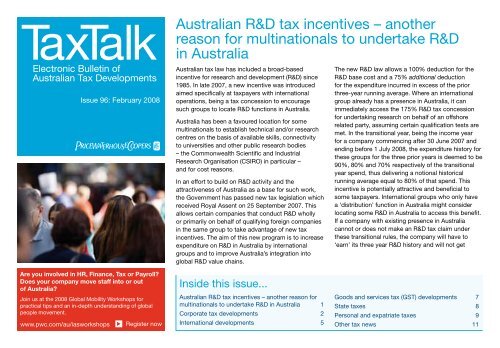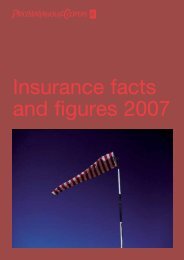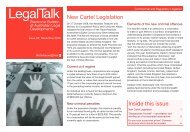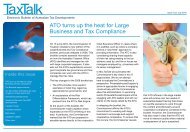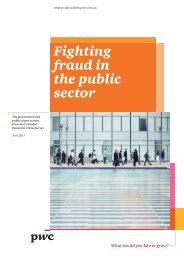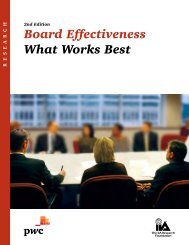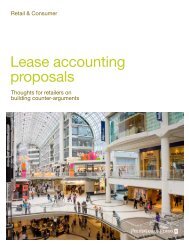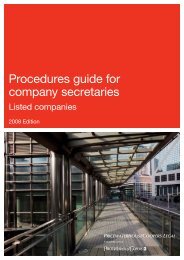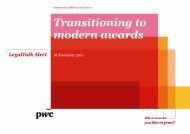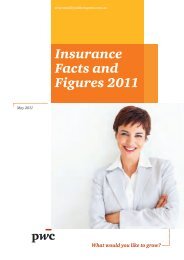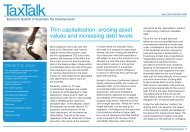Australian R&D tax incentives â another reason for ... - PwC
Australian R&D tax incentives â another reason for ... - PwC
Australian R&D tax incentives â another reason for ... - PwC
You also want an ePaper? Increase the reach of your titles
YUMPU automatically turns print PDFs into web optimized ePapers that Google loves.
TaxTalk<br />
Electronic Bulletin of<br />
<strong>Australian</strong> Tax Developments<br />
Issue 96: February 2008<br />
<strong>Australian</strong> R&D <strong>tax</strong> <strong>incentives</strong> – <strong>another</strong><br />
<strong>reason</strong> <strong>for</strong> multinationals to undertake R&D<br />
in Australia<br />
<strong>Australian</strong> <strong>tax</strong> law has included a broad-based<br />
incentive <strong>for</strong> research and development (R&D) since<br />
1985. In late 2007, a new incentive was introduced<br />
aimed specifically at <strong>tax</strong>payers with international<br />
operations, being a <strong>tax</strong> concession to encourage<br />
such groups to locate R&D functions in Australia.<br />
Australia has been a favoured location <strong>for</strong> some<br />
multinationals to establish technical and/or research<br />
centres on the basis of available skills, connectivity<br />
to universities and other public research bodies<br />
– the Commonwealth Scientific and Industrial<br />
Research Organisation (CSIRO) in particular –<br />
and <strong>for</strong> cost <strong>reason</strong>s.<br />
In an ef<strong>for</strong>t to build on R&D activity and the<br />
attractiveness of Australia as a base <strong>for</strong> such work,<br />
the Government has passed new <strong>tax</strong> legislation which<br />
received Royal Assent on 25 September 2007. This<br />
allows certain companies that conduct R&D wholly<br />
or primarily on behalf of qualifying <strong>for</strong>eign companies<br />
in the same group to take advantage of new <strong>tax</strong><br />
<strong>incentives</strong>. The aim of this new program is to increase<br />
expenditure on R&D in Australia by international<br />
groups and to improve Australia’s integration into<br />
global R&D value chains.<br />
The new R&D law allows a 100% deduction <strong>for</strong> the<br />
R&D base cost and a 75% additional deduction<br />
<strong>for</strong> the expenditure incurred in excess of the prior<br />
three-year running average. Where an international<br />
group already has a presence in Australia, it can<br />
immediately access the 175% R&D <strong>tax</strong> concession<br />
<strong>for</strong> undertaking research on behalf of an offshore<br />
related party, assuming certain qualification tests are<br />
met. In the transitional year, being the income year<br />
<strong>for</strong> a company commencing after 30 June 2007 and<br />
ending be<strong>for</strong>e 1 July 2008, the expenditure history <strong>for</strong><br />
these groups <strong>for</strong> the three prior years is deemed to be<br />
90%, 80% and 70% respectively of the transitional<br />
year spend, thus delivering a notional historical<br />
running average equal to 80% of that spend. This<br />
incentive is potentially attractive and beneficial to<br />
some <strong>tax</strong>payers. International groups who only have<br />
a ‘distribution’ function in Australia might consider<br />
locating some R&D in Australia to access this benefit.<br />
If a company with existing presence in Australia<br />
cannot or does not make an R&D <strong>tax</strong> claim under<br />
these transitional rules, the company will have to<br />
‘earn’ its three year R&D history and will not get<br />
Are you involved in HR, Finance, Tax or Payroll?<br />
Does your company move staff into or out<br />
of Australia?<br />
Join us at the 2008 Global Mobility Workshops <strong>for</strong><br />
practical tips and an in-depth understanding of global<br />
people movement.<br />
www.pwc.com/au/iasworkshops<br />
Register now<br />
Inside this issue...<br />
<strong>Australian</strong> R&D <strong>tax</strong> <strong>incentives</strong> – <strong>another</strong> <strong>reason</strong> <strong>for</strong><br />
multinationals to undertake R&D in Australia 1<br />
Corporate <strong>tax</strong> developments 2<br />
International developments 5<br />
Goods and services <strong>tax</strong> (GST) developments 7<br />
State <strong>tax</strong>es 8<br />
Personal and expatriate <strong>tax</strong>es 9<br />
Other <strong>tax</strong> news 11
TaxTalk – Electronic Bulletin of <strong>Australian</strong> Tax Developments<br />
access to the additional 75%<br />
deduction until at least 2012.<br />
Where neither a company nor any<br />
associate has been present in Australia<br />
<strong>for</strong> at least 10 years (including a<br />
branch operation), the prior history is<br />
deemed to be zero and there<strong>for</strong>e all of<br />
the R&D expenditure in the first year<br />
could be claimable at the 175% rate.<br />
To illustrate this, if such a company<br />
spent $10 million on qualifying R&D<br />
in a technical centre, it would get an<br />
additional <strong>tax</strong> deduction of $7.5 million<br />
in year one, which is a <strong>tax</strong> benefit of<br />
$2.25 million. This treatment presents<br />
opportunities to those international<br />
groups who have not previously been<br />
in the <strong>Australian</strong> market, or at least not<br />
at any time during the past 10 years. It<br />
could be attractive, <strong>for</strong> example, if such<br />
a group wished to establish a technical<br />
centre in Australia to carry out R&D<br />
<strong>for</strong> the wider group. For a period of<br />
years, the effective <strong>Australian</strong> <strong>tax</strong> rate<br />
could be quite low, thus benefiting the<br />
international group overall.<br />
This <strong>tax</strong> break adds to the<br />
attractiveness of Australia as an R&D<br />
centre in terms of new entrants, as<br />
it represents a very competitive <strong>tax</strong><br />
outcome. Setting up new R&D facilities<br />
in Australia is a win-win situation<br />
<strong>for</strong> international groups shifting<br />
R&D to Australia, as well as <strong>for</strong> the<br />
<strong>Australian</strong> economy.<br />
For further in<strong>for</strong>mation, please contact your<br />
usual PricewaterhouseCoopers adviser, or:<br />
Gary Waugh, Partner<br />
PricewaterhouseCoopers Tax<br />
Research & Development<br />
Phone: +61 7 3257 8694<br />
gary.waugh@au.pwc.com<br />
Sandra Mason, Partner<br />
PricewaterhouseCoopers Tax<br />
Research & Development<br />
Phone: +61 2 8266 0470<br />
sandra.mason@au.pwc.com<br />
Tony Baxter, Partner<br />
PricewaterhouseCoopers Tax<br />
Research & Development<br />
Phone: +61 3 8603 4209<br />
tony.baxter@au.pwc.com<br />
Corporate <strong>tax</strong> developments<br />
Thin capitalisation: how<br />
safe is the safe harbour?<br />
Draft Taxation Determination<br />
TD 2007/D20 issued on 28 November<br />
2007, discusses the inter-relationship<br />
between the ‘transfer pricing<br />
provisions’ and the thin capitalisation<br />
(TC) rules in relation to ‘debt<br />
deductions’ i.e. the price of debt that<br />
may be deductible <strong>for</strong> <strong>tax</strong> purposes.<br />
The Draft Determination states that the<br />
transfer pricing provisions cannot be<br />
applied where they would defeat the<br />
operation of the TC provisions which<br />
allow an entity to select a statutory<br />
safe harbour debt amount. The transfer<br />
pricing provisions cannot be applied<br />
to completely deny deductions <strong>for</strong><br />
funding costs on debt that is not<br />
“excess debt” <strong>for</strong> TC purposes merely<br />
because those deductions relate to<br />
a portion of the total debt funding<br />
that might be considered excessive<br />
when compared to the debt levels that<br />
would be required <strong>for</strong> the entity to be<br />
regarded as an independent entity<br />
dealing wholly independently in respect<br />
of its debt funding arrangements.<br />
However, the Commissioner’s view<br />
is that where an entity does not have<br />
excess debt <strong>for</strong> TC purposes, that<br />
does not mean that the transfer pricing<br />
provisions cannot be applied to adjust<br />
the pricing of the associated costs<br />
with reference to what is considered<br />
to be the appropriate debt/equity level<br />
if the company had been ‘financially<br />
independent’. The Determination<br />
illustrates this scenario by way of<br />
an example.<br />
In the example, a company (not being<br />
an authorised deposit-taking institution)<br />
has a debt level of $300 million with a<br />
20% per annum interest rate applying.<br />
The loan has been provided by the<br />
<strong>for</strong>eign parent, which is resident in a<br />
country which has a double <strong>tax</strong> treaty<br />
(DTA) with Australia. The company<br />
has equity of $100 million and a safe<br />
harbour debt amount under the TC<br />
provisions of $300 million. The interest<br />
rate on the debt has been set to<br />
reflect the fact that, by reference to<br />
industry standards, the company is<br />
thinly capitalised.<br />
Additional facts from the example<br />
are that if the company had been<br />
‘financially independent’, the interest<br />
rate payable by the company on<br />
its debt would have been 10% per<br />
annum, because the company would<br />
have had less debt and more equity.<br />
Thus the draft Determination states<br />
that the interest deduction <strong>for</strong> the year<br />
should be reduced under the ‘transfer<br />
page
TaxTalk – Electronic Bulletin of <strong>Australian</strong> Tax Developments<br />
pricing provisions’ from $60 million<br />
to $30 million be<strong>for</strong>e applying the TC<br />
rules. Since the company’s debt level<br />
is not greater than the TC safe harbour<br />
debt amount, there would not be a<br />
disallowance of any part of the $30<br />
million deduction under the TC rules.<br />
The Commissioner appears to have<br />
<strong>for</strong>med the view illustrated by the<br />
example by effectively incorporating<br />
provisions of Australia’s DTAs (namely<br />
the Business Profits Article and<br />
Associated Enterprises Article) into<br />
the transfer pricing provisions in the<br />
Income Tax Assessment Act 1936.<br />
In the opinion of<br />
PricewaterhouseCoopers this approach<br />
is contrary to long-established and<br />
publicly stated administration of the<br />
transfer pricing provisions by the ATO<br />
as well as the arm’s length principle<br />
supported by the OECD. Furthermore,<br />
the proposed approach would appear<br />
to be contrary to the policy intention<br />
behind the TC regime.<br />
PricewaterhouseCoopers have raised<br />
these concerns in representations<br />
made to the <strong>Australian</strong> Taxation<br />
Office (ATO) with regard to the<br />
draft Determination.<br />
When the final Determination is issued,<br />
it is proposed to apply both be<strong>for</strong>e and<br />
after its date of issue.<br />
Reconsideration of<br />
consolidation uplift<br />
involving scrip <strong>for</strong><br />
scrip arrangements<br />
In our November 2007 edition of<br />
TaxTalk, we reported that the Minister<br />
<strong>for</strong> Revenue and Assistant Treasurer,<br />
Peter Dutton, had announced that the<br />
Government intended to change the<br />
<strong>tax</strong> consolidation rules. This change<br />
is to ensure that when an entity joins<br />
a consolidated or a multiple entry<br />
consolidated (MEC) group following<br />
a capital gains <strong>tax</strong> (CGT) roll-over<br />
affecting the membership interests of<br />
the joining entity, the <strong>tax</strong> cost setting<br />
rules will not apply to uplift the costs of<br />
the joining entity’s assets.<br />
With the change in Government,<br />
the new Assistant Treasurer, Chris<br />
Bowen, made an announcement on<br />
11 January 2008 stating that the new<br />
Government would now be moving to<br />
allay concerns in industry regarding<br />
Mr Dutton’s previous announcements,<br />
given the disruption they have had<br />
on the operation of <strong>Australian</strong> capital<br />
markets, and in particular scrip <strong>for</strong><br />
scrip transactions.<br />
Mr Bowen said - “It is quite clear that<br />
there was insufficient consultation<br />
with the private sector by the previous<br />
Government in relation to this decision.<br />
I have asked the Treasury to consult<br />
with the private sector about how<br />
this situation will be resolved. This<br />
situation is quite urgent, it is necessary<br />
that this consultation be conducted<br />
expeditiously, and be completed<br />
by mid-February. It is necessary<br />
to ensure that the changes protect<br />
public revenue while not having the<br />
unintended consequence of hindering<br />
the operation of scrip <strong>for</strong> scrip<br />
transactions. Accordingly, I have asked<br />
that the consultation focus on ensuring<br />
non-contrived commercial takeovers<br />
involving an exchange of scrip are not<br />
affected by the changes”.<br />
With capital markets already in the<br />
midst of ‘sub-prime’ concerns,<br />
it is hoped that this matter can be<br />
expeditiously and sensibly resolved.<br />
Convertible notes and the<br />
debt and equity rules<br />
Draft Taxation Ruling TR 2007/D11,<br />
issued on 28 November 2007, sets out<br />
the Commissioner’s preliminary view as<br />
to whether the issuer of a convertible<br />
note has an ‘effectively non-contingent<br />
obligation’ to provide ‘financial<br />
benefits’ <strong>for</strong> the purposes of the debt<br />
test in the <strong>tax</strong> law in circumstances<br />
where the issuer can, at any time of<br />
its choosing, exercise a discretion to<br />
convert the note into an equity interest<br />
in the issuer company. TR 2007/D11<br />
replaces draft Taxation Determination<br />
TD 2004/D76, which is withdrawn on<br />
and from 28 November 2007. To the<br />
extent that the Commissioner’s views<br />
in that draft Taxation Determination still<br />
apply, they have been incorporated<br />
into TR 2007/D11.<br />
TR 2007/D11 applies to issuers of a<br />
convertible note where the convertible<br />
note is issued by a company to a<br />
lender <strong>for</strong> a fixed or indefinite term,<br />
with the following features:<br />
• <strong>for</strong> the purposes of the debt and<br />
equity provisions, the convertible<br />
note is issued under a scheme that<br />
is a financing arrangement <strong>for</strong> the<br />
issuer and is issued by a company<br />
<strong>for</strong> an issue price<br />
• the issuer has the right to terminate<br />
the convertible note at any time by<br />
providing shares that are ‘equity<br />
interests’ in the issuer, and<br />
• alternatively, the issuer must<br />
return the issue price to the<br />
lender at the end of the life of<br />
the convertible note.<br />
The draft Ruling states that the issuer<br />
of a convertible note that can be<br />
converted at any time, at the issuer’s<br />
discretion, into a share that is an<br />
equity interest in the issuer, will not<br />
have an effectively non-contingent<br />
obligation to provide financial benefits<br />
<strong>for</strong> the purposes of the debt test,<br />
unless that option to convert should<br />
page
TaxTalk – Electronic Bulletin of <strong>Australian</strong> Tax Developments<br />
be disregarded in light of the full<br />
consideration of the pricing, terms<br />
and conditions under which the note<br />
was issued. Since generally there<br />
would be no effectively non-contingent<br />
obligation to provide financial benefits,<br />
the convertible note issue would not<br />
satisfy the debt test and would be an<br />
‘equity interest’.<br />
Once finalised, the Ruling will apply<br />
both be<strong>for</strong>e and after its date of issue.<br />
<strong>Australian</strong> Tax Office<br />
position on s45B and<br />
capital reductions<br />
On 20 December 2007, the<br />
Commissioner issued draft Practice<br />
Statement PS LA 1552, outlining the<br />
Commissioner’s proposed application<br />
of the anti-capital streaming rules in<br />
s45B of the Income Tax Assessment<br />
Act 1936 (ITAA 1936) to capital<br />
reductions. Draft PS LA 1552 explains<br />
that s45B was introduced because of<br />
changes in 1998 to the Corporations<br />
Law which removed some of the<br />
restrictions on share capital reductions<br />
by giving companies the ability<br />
to return capital, subject to the<br />
reduction being fair and <strong>reason</strong>able<br />
to shareholders as a whole and not<br />
prejudicial to creditors. As a result of<br />
these changes to the Corporations<br />
Law, the <strong>tax</strong> law was amended to<br />
include a general anti-avoidance<br />
provision concerned with providing<br />
a framework that would prevent<br />
companies from distributing what<br />
are effectively profits to shareholders<br />
as preferentially-<strong>tax</strong>ed capital rather<br />
than dividends.<br />
Since its introduction, s45B has been<br />
a continuing concern <strong>for</strong> corporate<br />
Australia, and more so with the<br />
provision being extended to non-share<br />
equity interests with effect from 1 July<br />
2001. The Commissioner has now<br />
issued this draft Practice Statement as<br />
a starting point in providing guidance<br />
to corporate Australia on the way in<br />
which the Commissioner considers the<br />
provision applies. On this aspect, the<br />
draft Practice Statement provides a<br />
number of examples.<br />
Importantly, the Commissioner states<br />
that s45B is not a “profits first” rule but,<br />
rather, it is a sanction against schemes<br />
to provide shareholders with capital<br />
benefits, including distributions of<br />
share capital, which were entered into<br />
or carried out <strong>for</strong> a significant purpose<br />
of enabling the shareholder to benefit<br />
from receiving preferentially <strong>tax</strong>ed<br />
capital rather than profit. However, the<br />
Commissioner goes on to state that<br />
although s45B does not apply on a<br />
“profits first” basis, by implication it<br />
does presuppose some objective non<strong>tax</strong><br />
basis <strong>for</strong> distributing capital rather<br />
than profits, where both are available.<br />
Comments on draft PS LA 1552 were<br />
due by 29 January 2008.<br />
Private companies and<br />
deemed dividends<br />
Taxation Determination TD 2008/1,<br />
issued on 16 January 2008, sets out<br />
the Commissioner’s views regarding<br />
failure by a shareholder (or their<br />
associate) to repay a trade debt<br />
owed to a private company within<br />
the agreed payment term and the<br />
operation of the deemed dividend<br />
exclusion in s109M of Division 7A of<br />
the ITAA 1936. The Commissioner is<br />
of the view that such a failure does not<br />
prevent the exclusion from applying,<br />
where the private company deals with<br />
the failure to pay in the same manner<br />
in which it deals with defaults on<br />
similar loans made to parties at arm’s<br />
length. This Determination sets out the<br />
same position as that reflected in its<br />
predecessor draft, TD 2007/D17.<br />
Share issues and<br />
clarification on cost<br />
base rules<br />
Draft Taxation Ruling TR 2008/D1,<br />
issued on 16 January 2008, sets<br />
out the Commissioner’s preliminary<br />
views on the <strong>tax</strong> consequences<br />
<strong>for</strong> companies of issuing shares as<br />
consideration <strong>for</strong> acquisition of assets.<br />
In particular, the Draft Ruling expresses<br />
the preliminary view that:<br />
• A company issuing shares to acquire<br />
assets incurs no loss or outgoing <strong>for</strong><br />
the purposes of s8-1 of the Income<br />
Tax Assessment Act 1997 (ITAA<br />
1997). However, TR 2008/D1 states<br />
that the availability of a deduction<br />
under s8-1 <strong>for</strong> a loss or outgoing<br />
incurred to acquire assets is not<br />
affected by the company “setting<br />
off” its obligation in satisfaction of<br />
an independently arising obligation<br />
of the vendor of the assets to<br />
subscribe <strong>for</strong> shares in the company.<br />
In this event, the company may be<br />
entitled to claim a deduction <strong>for</strong><br />
the loss or outgoing it incurred to<br />
acquire the asset, notwithstanding<br />
that it pays <strong>for</strong> the asset by way of<br />
set-off against the consideration due<br />
to it <strong>for</strong> the issue of the shares.<br />
• Trading stock acquired by issuing<br />
shares will ordinarily have no cost<br />
<strong>for</strong> income <strong>tax</strong> purposes, since there<br />
can be no cost <strong>for</strong> trading stock<br />
where there is no loss, outgoing or<br />
expenditure incurred to acquire the<br />
stock. However, where the disposal<br />
of the trading stock is outside the<br />
ordinary course of the vendor’s<br />
business, the company is treated<br />
as having acquired the stock <strong>for</strong><br />
the amount included in the vendor’s<br />
assessable income and there<strong>for</strong>e<br />
page
TaxTalk – Electronic Bulletin of <strong>Australian</strong> Tax Developments<br />
as having incurred expenditure of<br />
that amount. Accordingly, the assets<br />
will have a “cost” <strong>for</strong> income <strong>tax</strong><br />
purposes in these cases.<br />
• A company issuing shares as<br />
consideration <strong>for</strong> the acquisition of<br />
depreciating assets, has a cost of<br />
those assets <strong>for</strong> the purposes of<br />
Division 40 of the ITAA 1997 equal to<br />
the market value of the shares at the<br />
relevant time.<br />
• For capital gains <strong>tax</strong> (CGT)<br />
purposes, the market value of shares<br />
issued as consideration to acquire<br />
an asset will be a component of the<br />
CGT cost base of the assets. In this<br />
respect, although when a company<br />
issues shares as consideration <strong>for</strong><br />
assets, the provision of the shares<br />
is not money paid or required to be<br />
paid, and does not involve a liability<br />
to pay money, it is the provision<br />
of property given, or required to<br />
be given, in respect of acquiring<br />
the assets.<br />
The Draft Ruling does not deal with<br />
the <strong>tax</strong> consequences <strong>for</strong> <strong>tax</strong>payers of<br />
receiving shares <strong>for</strong> assets.<br />
Comments can be made on the Draft<br />
Ruling until 29 February 2008. Once<br />
finalised, the Ruling will apply both<br />
be<strong>for</strong>e and after its date of issue.<br />
International developments<br />
Revised double <strong>tax</strong> treaty<br />
(DTA) with Finland<br />
According to the Department of<br />
Treasury website, the revised Australia-<br />
Finland DTA entered into <strong>for</strong>ce on 10<br />
November 2007. This revised DTA<br />
reduces withholding <strong>tax</strong> on certain<br />
dividend, interest and royalty payments<br />
in line with Australia’s <strong>tax</strong> treaties<br />
with the United States and the United<br />
Kingdom, and the more recent DTAs<br />
with France and Norway.<br />
For <strong>Australian</strong> <strong>tax</strong> purposes, the<br />
revised DTA with Finland has effect<br />
on income derived by a non-resident<br />
to whom the DTA applies from the<br />
following dates:<br />
• in relation to withholding <strong>tax</strong> - on<br />
income derived by a non-resident,<br />
including dividends, royalties and<br />
interest, on or after 1 January<br />
2008, and<br />
• in relation to other <strong>Australian</strong> <strong>tax</strong><br />
on income, profits or gains - any<br />
income year beginning on or after<br />
1 July 2008.<br />
For Finnish <strong>tax</strong> purposes, the DTA<br />
will have effect in respect of <strong>tax</strong>es<br />
as follows:<br />
• in relation to <strong>tax</strong>es on income<br />
withheld at source - derived on or<br />
after 1 January 2008, and<br />
• in relation to other <strong>tax</strong>es on income<br />
- where <strong>tax</strong>es are chargeable in any<br />
income year beginning on or after<br />
1 January 2008.<br />
Additionally, the new DTA will have<br />
effect in relation to the exchange of<br />
in<strong>for</strong>mation (Article 25) between the<br />
two countries from 10 November 2007,<br />
and in relation to the assistance in<br />
collection of <strong>tax</strong>es (Article 26), the DTA<br />
has effect from a date, presently not<br />
known, agreed in an exchange of notes<br />
between Australia and Finland.<br />
Canadian goods and<br />
services <strong>tax</strong> rate reduction<br />
As expected, on 31 December 2007,<br />
the Canadian Government announced<br />
the reduction of the goods and<br />
services <strong>tax</strong> rate to 5% effective<br />
from 1 January 2008. The reduction<br />
in the rate is part of a two-stage<br />
process announced as part of the<br />
Government’s 2005-2006 election<br />
campaign. The reduction from 6% to<br />
5% builds on the Government’s initial<br />
cut from 7% to 6% on 1 July 2006.<br />
New Zealand proposes<br />
changes to the <strong>tax</strong>ation<br />
of <strong>for</strong>eign dividends<br />
The New Zealand (NZ) <strong>tax</strong> authorities<br />
released an Issues Paper proposing<br />
significant changes to the <strong>tax</strong>ation of<br />
<strong>for</strong>eign dividends under the proposed<br />
re<strong>for</strong>ms to NZ’s international <strong>tax</strong><br />
rules that include an active income<br />
exemption <strong>for</strong> controlled <strong>for</strong>eign<br />
companies (CFCs). The Paper<br />
also discusses transitional and<br />
consequential matters related to the<br />
repeal of the “conduit rules” and the<br />
treatment of existing attributed CFC<br />
losses and carried <strong>for</strong>ward <strong>for</strong>eign<br />
<strong>tax</strong> credits.<br />
Key proposals include:<br />
• ordinary dividends received by NZ<br />
companies from CFCs and nonportfolio<br />
<strong>for</strong>eign investment funds<br />
(FIFs) will be exempt from NZ <strong>tax</strong><br />
• the treatment of dividends when the<br />
interest held is a “fixed-rate share”<br />
will be dealt with in a later review of<br />
the non-portfolio FIFs. In the interim,<br />
these dividends will continue to<br />
be <strong>tax</strong>able<br />
• dividend withholding payment<br />
(DWP) will be repealed <strong>for</strong> most<br />
<strong>for</strong>eign dividends derived by NZ<br />
resident companies in the 2009-<br />
2010 and later income years. As a<br />
page
TaxTalk – Electronic Bulletin of <strong>Australian</strong> Tax Developments<br />
consequence, the underlying <strong>for</strong>eign<br />
<strong>tax</strong> credit (UFTC) rules will become<br />
redundant and will also be repealed<br />
• most <strong>for</strong>eign dividends from portfolio<br />
interests received by companies will<br />
be exempt. Dividends derived from<br />
entities that are exempt from the FIF<br />
rules will continue to be <strong>tax</strong>ed<br />
• with the repeal of the conduit rules,<br />
conduit <strong>tax</strong> relief account balances<br />
as at the start of the 2009-2010<br />
income year will be cancelled,<br />
subject to a transitional antiavoidance<br />
rule, and<br />
• attributed CFC net losses and<br />
<strong>for</strong>eign <strong>tax</strong> credits accrued under<br />
the current rules can be carried<br />
<strong>for</strong>ward into the new system, but will<br />
continue to be reduced by reference<br />
to total CFC net income (including<br />
non-attributable income).<br />
The <strong>tax</strong>ation of <strong>for</strong>eign dividends<br />
received by persons other than<br />
companies (such as individuals<br />
and trustees) is not affected by<br />
the proposals.<br />
The suggested changes would apply<br />
from the start of the 2009–2010<br />
income year.<br />
The deadline <strong>for</strong> commenting on the<br />
proposals is 15 February 2008.<br />
New Zealand: review<br />
aimed at reducing<br />
compliance costs<br />
A NZ Government Discussion Paper<br />
released on 5 December 2007 seeks<br />
feedback on a range of ideas aimed at<br />
reducing <strong>tax</strong>-related compliance costs<br />
<strong>for</strong> small and medium-sized enterprises<br />
(SMEs). Measures suggested include:<br />
• raising business <strong>tax</strong> thresholds<br />
<strong>for</strong> certain Pay As You Earn, fringe<br />
benefits <strong>tax</strong> (FBT) and goods<br />
and services <strong>tax</strong> (GST) filing and<br />
registration requirements, and<br />
introducing a single threshold <strong>for</strong><br />
certain concessions<br />
• simplifying the rules <strong>for</strong> deducting<br />
entertainment and legal expenses<br />
• <strong>for</strong> FBT purposes, introducing a<br />
single category of restricted private<br />
use motor vehicles <strong>for</strong> SMEs<br />
and simplifying record-keeping<br />
requirements <strong>for</strong> the private use of<br />
motor vehicles<br />
• simplifying GST invoice disclosure<br />
requirements, and<br />
• <strong>for</strong> <strong>tax</strong> administration purposes,<br />
allowing the correction of minor<br />
errors in subsequent returns and<br />
reviewing certain other rules.<br />
Some of the measures would generally<br />
apply from 1 April 2009 and are<br />
proposed to be included in the next<br />
available <strong>tax</strong>ation Bill (eg the thresholdrelated<br />
amendments). The more<br />
complex measures will be included in a<br />
later <strong>tax</strong> Bill, with the likely application<br />
date being 1 April 2010.<br />
Closing dates <strong>for</strong> submissions are<br />
31 January 2008 <strong>for</strong> submissions on<br />
thresholds, and 29 February 2008 <strong>for</strong><br />
submissions on all other matters.<br />
For further in<strong>for</strong>mation please contact your<br />
usual PricewaterhouseCoopers adviser, or:<br />
Peter Collins, Partner<br />
PricewaterhouseCoopers Tax<br />
International Tax and<br />
Transaction Services<br />
Phone: +61 3 8603 6247<br />
peter.collins@au.pwc.com<br />
Norah Seddon, Partner<br />
PricewaterhouseCoopers Tax<br />
International Tax and<br />
Transaction Services<br />
Phone: +61 2 8266 5864<br />
norah.seddon@au.pwc.com<br />
United Kingdom (UK)<br />
proposal to <strong>tax</strong> interest<br />
like returns<br />
On Thursday 6 December 2007, the<br />
UK Revenue published a consultation<br />
document detailing proposed draft<br />
legislation in relation to “financial<br />
products <strong>tax</strong> avoidance”. In the<br />
past, the UK Government has often<br />
responded to avoidance by setting out<br />
detailed rules which target a specific<br />
arrangement. In a departure from<br />
this approach, the UK Government<br />
proposes to introduce “principlebased”<br />
legislation as follows:<br />
• The disguised interest principle: A<br />
return designed to be economically<br />
equivalent to interest is to be <strong>tax</strong>ed<br />
in the same way as interest.<br />
Where a UK company is party<br />
to an arrangement designed to<br />
produce an interest-like return that<br />
is not <strong>tax</strong>ed or not wholly <strong>tax</strong>ed,<br />
the proposed rules may <strong>tax</strong> returns<br />
as if they were returns on a loan<br />
relationship (ie <strong>tax</strong> returns on the<br />
arrangement like interest income<br />
which is <strong>tax</strong>ed on an accruals<br />
basis). Targeted schemes will be<br />
those which seek to convert <strong>tax</strong>able<br />
interest into an exempt dividend or<br />
capital gain.<br />
For example, a UK company holding<br />
redeemable preference shares<br />
page
TaxTalk – Electronic Bulletin of <strong>Australian</strong> Tax Developments<br />
issued by a UK or <strong>for</strong>eign company<br />
might result in a <strong>tax</strong> liability to the<br />
holder without any deduction to<br />
the issuer.<br />
• The principle <strong>for</strong> income stream<br />
transfers: Receipts which are<br />
derived from a right to receive<br />
income and do not involve any loss<br />
of capital are economic substitutes<br />
<strong>for</strong> income and are to be treated <strong>for</strong><br />
<strong>tax</strong> purposes as income.<br />
Targeted schemes will be those<br />
which are designed to turn<br />
economic income into a return that<br />
is treated by <strong>tax</strong> law as capital.<br />
The consultation document invites<br />
detailed comments on the proposed<br />
legislation by the end of February 2008.<br />
Legislation is intended to be introduced<br />
in Finance Bill 2008 (ie effective<br />
1 April 2008).<br />
For further in<strong>for</strong>mation please contact your<br />
usual PricewaterhouseCoopers adviser, or:<br />
Neil Fuller, Partner<br />
PricewaterhouseCoopers Tax<br />
International Tax and<br />
Transaction Services<br />
Phone: +61 2 8266 2025<br />
neil.fuller@au.pwc.com<br />
Germany: <strong>tax</strong> amendments<br />
<strong>for</strong> 2008<br />
The 2008 Annual Tax Bill was enacted<br />
on 29 December 2007. From an<br />
international <strong>tax</strong> structuring point<br />
of view, the most relevant changes<br />
brought by the Bill are:<br />
• the non-deductibility of losses<br />
connected with inter-company<br />
loan receivables<br />
• the re-written general anti-abuse rule<br />
• the <strong>tax</strong>ation of previously un<strong>tax</strong>ed<br />
profits (so-called ‘EK 02’)<br />
• the non-applicability of German<br />
controlled <strong>for</strong>eign company<br />
(CFC) rules within the European<br />
Union/European Economic<br />
Community, and<br />
• the reduction in the non deductible<br />
amount of certain finance costs <strong>for</strong><br />
trade <strong>tax</strong> purposes.<br />
The new rules will generally apply<br />
to assessment periods from<br />
2008 onwards.<br />
For further in<strong>for</strong>mation please contact your<br />
usual PricewaterhouseCoopers adviser, or:<br />
Christian Holle, Partner<br />
PricewaterhouseCoopers Tax<br />
International Tax<br />
Phone: +61 2 8266 5697<br />
christian.holle@au.pwc.com<br />
Goods and services <strong>tax</strong><br />
(GST) developments<br />
New exempt <strong>tax</strong>es, fees<br />
and charges determination<br />
Division 81 of the A New Tax System<br />
(Goods and Services Tax) Act 1999<br />
(GST Act) provides that GST applies<br />
to payments of <strong>tax</strong>es, fees and<br />
charges, except those <strong>tax</strong>es, fees<br />
and charges that are excluded by<br />
a determination of the Treasurer.<br />
A New Tax System (Goods and<br />
Services Tax) (Exempt Taxes, Fees and<br />
Charges) Determination 2008 (No.1),<br />
registered on 16 January 2008, lists<br />
the fees, <strong>tax</strong>es, and charges that are<br />
excluded from the scope of GST by<br />
a determination of the Treasurer (in<br />
accordance with Division 81). The<br />
Determination replaces the <strong>for</strong>mer year<br />
2007 Determination and is effective<br />
from 17 January 2008.<br />
High Court grants special<br />
leave in Reliance Carpet<br />
In our August 2007 edition of TaxTalk,<br />
we reported that the Full Federal<br />
Court in Reliance Carpet Co Pty Ltd<br />
v Commissioner of Taxation [2007]<br />
FCAFC 99 (5 July 2007) had held<br />
that there was no <strong>tax</strong>able supply in<br />
circumstances where a deposit <strong>for</strong> the<br />
sale of land was <strong>for</strong>feited, and thus<br />
there was no GST liability payable<br />
by the vendor. Not surprisingly, the<br />
Commissioner sought special leave<br />
from the High Court <strong>for</strong> this matter to<br />
be appealed, and on 14 December<br />
2007, the High Court granted this<br />
special leave request. The outcome<br />
of this appeal is eagerly awaited.<br />
For further in<strong>for</strong>mation, please contact your<br />
usual PricewaterhouseCoopers adviser, or:<br />
Patrick Walker,<br />
National GST Leader<br />
PricewaterhouseCoopers Tax<br />
Goods & Services Tax<br />
Phone: +61 2 8266 1596<br />
patrick.walker@au.pwc.com<br />
Kevin O’Rourke, Partner<br />
PricewaterhouseCoopers Tax<br />
Goods & Services Tax<br />
Phone: +61 2 8266 3114<br />
kevin.orourke@au.pwc.com<br />
Ken Fehily, Partner<br />
PricewaterhouseCoopers Tax<br />
Goods & Services Tax<br />
Phone: +61 3 8603 6216<br />
ken.fehily@au.pwc.com<br />
Michelle Tremain, Partner<br />
PricewaterhouseCoopers Tax<br />
Goods & Services Tax<br />
Phone: +61 8 9238 3403<br />
michelle.tremain@au.pwc.com<br />
page
TaxTalk – Electronic Bulletin of <strong>Australian</strong> Tax Developments<br />
State <strong>tax</strong>es<br />
New duty legislation in<br />
Western Australia (WA)<br />
Proposed legislation was introduced<br />
into the Western <strong>Australian</strong> Parliament<br />
on 28 November 2007 to replace<br />
the Stamp Act 1921 (WA). If passed<br />
by Parliament, the proposed<br />
commencement date of the new<br />
legislation is 1 July 2008.<br />
This proposed legislation represents<br />
substantial changes to the existing<br />
stamp duty law in WA. These<br />
substantial changes include<br />
measures to:<br />
• Introduce a new landholder<br />
regime that imposes duty on<br />
relevant acquisitions of interests<br />
in companies and unit trusts that<br />
directly or indirectly own interests<br />
in land in WA valued at $2 million<br />
or more.<br />
This measure will replace the<br />
existing landrich regime. Broadly,<br />
under the existing landrich regime,<br />
relevant acquisitions of interests in<br />
companies that directly or indirectly<br />
own Western <strong>Australian</strong> land valued<br />
at $1 million or more and where the<br />
value of all direct or indirect interests<br />
in land represent 60% or more of<br />
the value of all property to which<br />
the company is directly or indirectly<br />
entitled (excluding certain asset<br />
categories) are subject to duty.<br />
This measure represents a<br />
broadening of the <strong>tax</strong> base<br />
notwithstanding the increase in the<br />
land value threshold from $1 million<br />
to $2 million.<br />
• Extend the availability of exemptions<br />
from stamp duty <strong>for</strong> intra-group<br />
transfers of property.<br />
Currently, existing corporate<br />
reconstruction exemptions require<br />
the parties to be associated <strong>for</strong><br />
3 years be<strong>for</strong>e the transfer and<br />
to remain associated <strong>for</strong> a 5 year<br />
period after the transfer, and<br />
exemption is not available if one<br />
of the entities is a trust. Under the<br />
new provisions, the pre-transfer<br />
association requirement will<br />
be abolished, the post-transfer<br />
association requirement will be<br />
relaxed and the exemption will be<br />
extended to allow transfers to and<br />
from unit trusts.<br />
• Provide that duty is not payable<br />
on acquisitions of units in a private<br />
unit trust scheme unless the trust is<br />
a landholder (as described above)<br />
and 50% or more of the units (in<br />
total) are acquired. Currently, the<br />
acquisition of any units in a private<br />
unit trust scheme that owns property<br />
in WA can be subject to duty.<br />
• Reduce stamp duty rates by<br />
approximately 5%, with the<br />
maximum rate of duty applying to a<br />
transfer of property being reduced<br />
to 5.15%. The maximum rate is<br />
currently 5.4%.<br />
• Introduce a general anti-avoidance<br />
provision to apply to transactions<br />
that are blatant, artificial or contrived<br />
<strong>for</strong> the sole or dominant purpose of<br />
eliminating, reducing or postponing<br />
a liability to duty. Currently, a general<br />
anti-avoidance provision does<br />
not exist.<br />
<strong>Australian</strong> Capital Territory<br />
(ACT) duty amendments<br />
The ACT Duties Act 1999 has been<br />
amended with effect from 5 December<br />
2007 in respect of long-term leases<br />
which are dutiable, and also in respect<br />
of transitional provisions <strong>for</strong> other<br />
leases where duty is abolished from<br />
1 July 2009. The amendments include<br />
the following:<br />
• the definition and commencement of<br />
a long-term lease has been clarified<br />
and ensures that, where either a<br />
new lease granted on surrender<br />
of <strong>another</strong> lease to the same or<br />
associated person, or an extension<br />
of an existing lease, result in a<br />
term greater than 30 years, it is<br />
to be treated as if it were a longterm<br />
lease<br />
• there is clarification that an option<br />
to renew a lease granted be<strong>for</strong>e<br />
1 July 2009 may be included in the<br />
duty base if the option is executed<br />
after 30 June 2009, where the main<br />
purpose is to defer execution of the<br />
instrument to avoid lease duty, and<br />
• where a lease has been granted<br />
on surrender of <strong>another</strong> lease,<br />
and the lease results in a longterm<br />
lease, the duty that is payable<br />
at conveyance rates is to be<br />
reduced by the amount of any<br />
duty already paid under the original<br />
lease. The same position will also<br />
apply where the term of a lease<br />
is extended, or further extended.<br />
ACT payroll <strong>tax</strong> changes<br />
On 6 December 2007, changes to the<br />
ACT’s payroll <strong>tax</strong> laws were introduced<br />
into Parliament. In introducing the<br />
changes, the Chief Minister stated that<br />
the “changes will make administration<br />
more consistent and reduce red tape<br />
and compliance costs <strong>for</strong> businesses<br />
across State and Territory borders.<br />
The changes are a result of an<br />
agreement in March by all State and<br />
Territory Treasurers to overhaul payroll<br />
page
TaxTalk – Electronic Bulletin of <strong>Australian</strong> Tax Developments<br />
<strong>tax</strong> arrangements. It was agreed<br />
that the States and Territories would<br />
focus on simplifying and harmonising<br />
payroll <strong>tax</strong> provisions, while retaining<br />
control over rates of <strong>tax</strong> and<br />
<strong>tax</strong>‐free thresholds”.<br />
According to the Chief Minister, the<br />
new Bill will implement the remaining<br />
agreed items and amend the existing<br />
payroll <strong>tax</strong> legislation to:<br />
• adopt an exemption to payroll<br />
<strong>tax</strong> <strong>for</strong> wages paid in the ACT <strong>for</strong><br />
employees who work in <strong>another</strong><br />
country <strong>for</strong> a continuous period of<br />
six months or more<br />
• adopt exemption rates <strong>for</strong><br />
motor vehicle allowances and<br />
accommodation allowances<br />
linked with those set annually by<br />
the <strong>Australian</strong> Taxation Office <strong>for</strong><br />
income deduction purposes<br />
• adopt a single ‘gross up’ factor<br />
<strong>for</strong> the purpose of calculating the<br />
amount to be taken as wages <strong>for</strong><br />
payroll <strong>tax</strong> purposes of benefits that<br />
attract a fringe benefits <strong>tax</strong> (FBT)<br />
liability, and<br />
• adopt the New South Wales<br />
and Victorian payroll <strong>tax</strong><br />
grouping provisions.<br />
There are also a number of transitional<br />
provisions and consequential<br />
amendments to other existing pieces<br />
of legislation.<br />
The changes are expected to take<br />
effect from 1 July 2008.<br />
Queensland (Qld)<br />
payroll <strong>tax</strong> relief <strong>for</strong><br />
emergency services<br />
The Qld Treasurer has announced<br />
that employers whose workers are<br />
deployed as emergency services<br />
volunteers will be exempt from paying<br />
payroll <strong>tax</strong> <strong>for</strong> the hours they spend<br />
away from their jobs in the field. The<br />
Treasurer said the exemption would<br />
apply <strong>for</strong> employers if staff are involved<br />
in bushfire fighting activities as a<br />
volunteer or in emergency activities<br />
as a volunteer emergency worker. The<br />
exemption will not apply to wages<br />
<strong>for</strong> recreation leave, annual leave,<br />
long service leave or sick leave. It<br />
is proposed that the exemption will<br />
take effect from 1 July 2008.<br />
For further in<strong>for</strong>mation please contact your<br />
usual PricewaterhouseCoopers adviser, or:<br />
Barry Diamond, Partner<br />
PricewaterhouseCoopers Tax<br />
Stamp Duty<br />
Phone: +61 3 8603 1118<br />
barry.diamond@au.pwc.com<br />
Angela Melick, Partner<br />
PricewaterhouseCoopers Tax<br />
Stamp Duty<br />
Phone: +61 2 8266 7234<br />
angela.melick@au.pwc.com<br />
Personal and expatriate <strong>tax</strong>es<br />
Legal costs were related<br />
to employment<br />
The Full Federal Court in Federal<br />
Commissioner of Taxation v Day<br />
[2007] FCAFC 193 has held that legal<br />
expenses incurred by a Customs<br />
officer were <strong>tax</strong> deductible. The costs<br />
were incurred by the <strong>tax</strong>payer in<br />
defending charges brought against<br />
the officer under the Public Service<br />
Act 1922 (Cth). The <strong>tax</strong>payer, a senior<br />
officer with the <strong>Australian</strong> Customs<br />
Service (ACS) was charged on three<br />
separate occasions <strong>for</strong> various alleged<br />
breaches of the relevant statute,<br />
namely <strong>for</strong> breaching the standards<br />
of conduct <strong>for</strong> ACS officers (“the<br />
first charge”), <strong>for</strong> failing to accurately<br />
record attendance in connection with<br />
his employment (“the second charge”)<br />
and <strong>for</strong> failing to fulfil his duties as an<br />
officer of the ACS (“the third charge”).<br />
In respect of the first charge, the<br />
<strong>tax</strong>payer had been demoted, but as<br />
a result of legal action, this demotion<br />
was overturned. The <strong>tax</strong>payer incurred<br />
legal costs in instigating this legal<br />
action. In respect of the second<br />
charge, the <strong>tax</strong>payer was initially<br />
required to pay an amount to the ACS,<br />
but this position was amended on<br />
an appeal to the relevant Disciplinary<br />
Committee, which ordered that the<br />
<strong>tax</strong>payer be transferred to <strong>another</strong><br />
position and paid accordingly. This,<br />
in effect, was a demotion. The <strong>tax</strong>payer<br />
incurred legal costs in respect of<br />
advice regarding the appeal. In respect<br />
of the third charge, the <strong>tax</strong>payer took<br />
legal action seeking orders from<br />
the Court including orders that the<br />
charges be set aside. The <strong>tax</strong>payer<br />
was unsuccessful in this regard and<br />
incurred substantial legal costs.<br />
At first instance, the Federal Court<br />
held that only the legal fees incurred<br />
in respect of the second charge were<br />
<strong>tax</strong> deductible, and the deductibility<br />
of these fees was not required to<br />
be reconsidered by the Full Court.<br />
The issue be<strong>for</strong>e the Full Court was<br />
whether the fees relating to the first<br />
and third charges were deductible<br />
under the general deduction provision<br />
of the <strong>tax</strong> law, and specifically, whether<br />
the amounts were incurred in gaining<br />
or producing assessable income.<br />
In a majority decision (Justice Dowsett<br />
dissenting), the Full Court held that<br />
the fees were <strong>tax</strong> deductible. In the<br />
view of Justice Edmonds, it was the<br />
<strong>tax</strong>payer’s employment which was<br />
“the occasion of the expenditure<br />
and the <strong>tax</strong>payer’s per<strong>for</strong>mance<br />
and observance of the duties of<br />
page
TaxTalk – Electronic Bulletin of <strong>Australian</strong> Tax Developments<br />
that employment is undoubtedly<br />
productive of assessable income”.<br />
His Honour noted that “In both cases,<br />
the <strong>tax</strong>payer is incurring expenditure<br />
(legal expenses) defending, in the first<br />
case, his per<strong>for</strong>mance of duties of<br />
his employment, and in the second<br />
case, his observance of duties of his<br />
employment. The per<strong>for</strong>mance of one<br />
kind of duty and the observance of the<br />
other kind of duty equally contribute to<br />
the <strong>tax</strong>payer’s continued employment<br />
which is productive of assessable<br />
income, and expenditure incurred<br />
in defence of either per<strong>for</strong>mance or<br />
observance of a duty is, in my view,<br />
occasioned by that employment.”<br />
Justice Spender was of a similar view.<br />
In contrast, Justice Dowsett held that<br />
none of the costs were deductible<br />
and stated that “where the conduct<br />
in question is quite beyond anything<br />
contemplated as being involved in the<br />
<strong>tax</strong>payer’s duties, it will be very difficult<br />
to apply the test established in Payne<br />
[a reference to the High Court decision<br />
in Commissioner of Taxation v Payne<br />
(2001) 202 CLR 93] in such a way as to<br />
render the outgoings deductible”.<br />
With a number of recent high profile<br />
Court cases alleging breaches of<br />
employment and director duties,<br />
this is an important decision <strong>for</strong><br />
those involved.<br />
Personal services business<br />
not carried on<br />
In IRG Technical Services Pty Limited<br />
v Deputy Commissioner of Taxation<br />
and KD Owen as trustee <strong>for</strong> Owen<br />
Family Trust v Deputy Commissioner of<br />
Taxation [2007] FCA 1867 (5 December<br />
2007), the Federal Court agreed with<br />
the Commissioner that the applicants<br />
were not entitled to a “‘personal<br />
services business determination’ in<br />
respect of income derived by each<br />
applicant. As a result, the income of<br />
each applicant was required to be<br />
returned as assessable income in the<br />
<strong>tax</strong> return of the individual from whose<br />
skill or personal ef<strong>for</strong>ts the income<br />
was derived.<br />
In this case, a resource company<br />
engaged labour procurement<br />
companies to obtain skilled engineers<br />
<strong>for</strong> a project. These procurement<br />
companies contracted with each<br />
applicant to procure the services of<br />
(in each case) a named individual,<br />
who was to provide services to the<br />
project. Thus each applicant’s income,<br />
paid to each applicant by the relevant<br />
labour procurement company, was<br />
effectively derived from the services<br />
provided to the project by the relevant<br />
named individual.<br />
Under the <strong>tax</strong> law, this income of the<br />
entity is to be treated as income of the<br />
relevant individual unless the income<br />
is from a ‘personal services business’<br />
of the entity. In the cases under<br />
consideration, this meant that each<br />
applicant was required to show that,<br />
in respect of the activities from which<br />
the income was derived, the ‘results<br />
test’ was or would be satisfied. That<br />
test is that generally at least 75% of<br />
the relevant income is <strong>for</strong> producing a<br />
result, the entity is required to supply<br />
the tools of trade necessary to produce<br />
the result, and the entity is liable <strong>for</strong><br />
rectifying any work per<strong>for</strong>med.<br />
In concluding that the ‘results test’<br />
was not satisfied, the Court found<br />
that the amounts paid by the resource<br />
company were not paid <strong>for</strong> results, but<br />
were paid <strong>for</strong> the time spent by each<br />
skilled individual as part of a team<br />
of workers engaged in the project.<br />
Importantly, the Court said that the<br />
‘deliverables’ were the product of<br />
the work of the team. In the Court’s<br />
view, the commercial arrangement<br />
was that payment would be made by<br />
the hour <strong>for</strong> 45 hours per week, paid<br />
each <strong>for</strong>tnight. There was no payment<br />
which was made <strong>for</strong> the production of<br />
a deliverable.<br />
For further in<strong>for</strong>mation please contact your<br />
usual PricewaterhouseCoopers adviser, or:<br />
Rohan Geddes, Partner<br />
PricewaterhouseCoopers Tax<br />
International Assignment Solutions<br />
Phone: +61 3 8603 3844<br />
rohan.geddes@au.pwc.com<br />
Jim Lijeski, Partner<br />
PricewaterhouseCoopers Tax<br />
International Assignment Solutions<br />
Phone: +61 2 8266 8298<br />
jim.lijeski@au.pwc.com<br />
Tony Halcrow, Director<br />
PricewaterhouseCoopers Tax<br />
International Assignment Solutions<br />
Phone: +61 2 8266 7279<br />
anthony.halcrow@au.pwc.com<br />
page 10
TaxTalk – Electronic Bulletin of <strong>Australian</strong> Tax Developments<br />
Other <strong>tax</strong> news<br />
No FBT on loan repayments<br />
In our April 2007 edition of TaxTalk, we<br />
reported that the Federal Court at first<br />
instance had held in Commissioner<br />
of Taxation v Slade Bloodstock [2007]<br />
FCA 188 that based on the particular<br />
facts of the case the repayments of<br />
loans to employees of a unit trust were<br />
subject to fringe benefits <strong>tax</strong> (FBT).<br />
In deciding against the employer and<br />
agreeing that FBT applied, Justice<br />
Heerey had made the observation that<br />
the particular employees had received<br />
no remuneration <strong>for</strong> their services to<br />
the employer, and the fact that the<br />
payments were made to extinguish an<br />
existing liability owed by the employer<br />
did not preclude the loan repayments<br />
from being classified as fringe benefits<br />
<strong>for</strong> FBT purposes.<br />
On appeal to the Full Federal Court,<br />
in a surprising development, the<br />
Commissioner agreed with the<br />
appellant <strong>tax</strong>payer that FBT should<br />
not apply to the repayments, and both<br />
the <strong>tax</strong>payer and the Commissioner<br />
applied <strong>for</strong> an order from the Court<br />
that the appeal should be allowed.<br />
In this respect, the Commissioner<br />
acknowledged that the repayments<br />
were not remuneration provided to the<br />
employees and that the repayments<br />
had arisen from the loan contract<br />
entered into by the parties, and that<br />
this loan contract was independent of<br />
any employment contract entered into.<br />
In making the consent orders<br />
requested, the Court agreed with the<br />
correctness at law of this position,<br />
stating that “our views on these issues<br />
are consistent with the policy and<br />
purpose underlying the fringe benefits<br />
<strong>tax</strong> legislation of which the FBT Act<br />
<strong>for</strong>ms an integral part. Fringe benefits<br />
<strong>tax</strong> was only ever intended to <strong>tax</strong> the<br />
provision of benefits where, if the<br />
benefit had been provided in cash,<br />
there would have been a derivation of<br />
income. It is true that it was also the<br />
policy and purpose of the legislation<br />
to <strong>tax</strong> benefits which might not be<br />
income of the employee because the<br />
benefit was provided to an associate<br />
of the employee or because the benefit<br />
could not be converted into money.<br />
But it was never intended to apply<br />
to a repayment of a loan made by<br />
an employee to his employer; such a<br />
repayment could never be a derivation<br />
of income by the lender/employee”.<br />
The Commissioner’s view of the<br />
law, as evidenced by his decision to<br />
request consent orders from the Court,<br />
puts at ease the concern of many<br />
<strong>tax</strong>payers who simply finance the<br />
activities of their business enterprise<br />
with debt, and obtain repayment of<br />
the debt when funds allow. There is<br />
clearly no remuneration from receiving<br />
repayment of one’s own funds, and the<br />
Commissioner’s agreement with this<br />
position is welcome news.<br />
Deductibility of<br />
management fees<br />
In two test cases (Spriggs v Federal<br />
Commissioner of Taxation [2007]<br />
FCA 1817 and Riddell v Federal<br />
Commissioner of Taxation [2007]<br />
FCA 1818), the Federal Court at first<br />
instance has held that management<br />
and agency fees incurred by two<br />
professional sport-persons were <strong>tax</strong><br />
deductible. The cases involved football<br />
players in the <strong>Australian</strong> Football<br />
League and the <strong>Australian</strong> Rugby<br />
League, respectively. In deciding that<br />
the fees were <strong>tax</strong> deductible under<br />
the general deduction provision of the<br />
<strong>tax</strong> law, the Court was satisfied that<br />
the fees were incurred as part of the<br />
income-producing business carried<br />
on by each <strong>tax</strong>payer, and were not<br />
incurred on capital account to secure a<br />
capital asset (as the Commissioner had<br />
argued), but rather, were incurred <strong>for</strong><br />
services provided by the agent on an<br />
ongoing basis to the <strong>tax</strong>payer.<br />
In rejecting the Commissioner’s<br />
arguments, the Court distinguished<br />
each case from the High Court<br />
decision in Federal Commissioner of<br />
Taxation v Maddalena (1971) 45 ALJR<br />
426, where the <strong>tax</strong>payer, a professional<br />
page 11
TaxTalk – Electronic Bulletin of <strong>Australian</strong> Tax Developments<br />
footballer, had claimed legal fees and<br />
travel costs incurred by him in securing<br />
a new playing contract. These costs<br />
were held to be non-deductible as they<br />
were incurred at a ‘point too soon’ to<br />
be considered as having been incurred<br />
in gaining assessable income. In the<br />
Spriggs and Riddell cases, Justice<br />
Gordon found that the costs were<br />
incurred only upon the footballer<br />
entering into the contract negotiated<br />
by the agent. The further matter upon<br />
which Justice Gordon distinguished<br />
these cases from Maddalena was the<br />
fact that, in Maddalena, the <strong>tax</strong>payer<br />
was not a full-time professional<br />
footballer, whereas the <strong>tax</strong>payer in<br />
both Spriggs and Riddell derived<br />
all their income from professional<br />
football activities.<br />
Not surprisingly, the Commissioner<br />
has appealed both decisions to the<br />
Full Federal Court.<br />
Bluebottle stung in a win <strong>for</strong><br />
the Commissioner<br />
In Bluebottle UK Limited v Deputy<br />
Commissioner of Taxation [2007]<br />
HCA 54 (5 December 2007), the High<br />
Court has unanimously found in the<br />
Commissioner’s favour by rejecting<br />
the <strong>tax</strong>payer’s appeal. This case<br />
concerned whether the assignment of<br />
an entitlement to dividends meant that<br />
a notice issued by the Commissioner<br />
Trust cloning may be ineffective<br />
On 4 December 2007, the<br />
Commissioner released a document<br />
(media release) on the <strong>Australian</strong><br />
Tax Office (ATO) website titled<br />
Trust Cloning. The document is<br />
designed to alert <strong>tax</strong> professionals<br />
and <strong>tax</strong>payers that certain ‘trust<br />
cloning’ arrangements entered into<br />
purportedly in reliance on Taxation<br />
Ruling TR 2006/4 may be ineffective.<br />
Taxation Ruling TR 2006/4 deals with<br />
a capital gains <strong>tax</strong> (CGT) exception<br />
that applies when an asset is<br />
transferred between two trusts that<br />
have the same beneficiaries and<br />
trust terms – commonly referred to<br />
as ‘trust cloning’. The Ruling says<br />
that even minor differences between<br />
the two trusts may prevent the<br />
exception from applying, though the<br />
trusts can have different trustees and<br />
settlors. The ATO’s understanding<br />
of the original legislative policy is<br />
that the exception was designed to<br />
apply only in respect of the transfer<br />
of an asset as a result of a change<br />
of trustee of a single trust. That is,<br />
the exception was not intended to<br />
apply in respect of the transfer of<br />
an asset between two separately<br />
existing trusts. Nevertheless, the ATO<br />
has acknowledged that the law was<br />
drafted and applies more broadly<br />
than suggested by the original policy,<br />
and can literally apply in relation to<br />
two trusts. However, the ATO states<br />
that the exception can only apply<br />
where the requirements that the terms<br />
and beneficiaries are the same are<br />
strictly satisfied.<br />
Since issuing TR 2006/4, the ATO has<br />
become aware of situations where<br />
trusts, particularly discretionary trusts,<br />
may not be ‘the same’ and there<strong>for</strong>e<br />
assets transferred between the trusts<br />
will trigger CGT. In other words,<br />
the exemption does not apply. The<br />
Commissioner expresses concern<br />
in this media release that some<br />
practitioners may not appreciate<br />
what is required <strong>for</strong> the exception<br />
to be satisfied. The media release<br />
provides certain examples where the<br />
exception will not apply. For example,<br />
the media release states that it may<br />
not be possible to clone a trust with<br />
named beneficiaries and a clause that<br />
also includes as a beneficiary any<br />
trust in which a named beneficiary<br />
has an interest (including as a<br />
potential object). Including this same<br />
clause in both trusts will result in the<br />
trustee of the new or ‘cloned’ trust<br />
being a beneficiary of the original<br />
trust and the trustee of the original<br />
trust being a beneficiary of the new<br />
trust. There<strong>for</strong>e, according to the<br />
Commissioner, the beneficiaries of<br />
the original trust will be the named<br />
beneficiaries and trustee of the new<br />
trust, and the beneficiaries of the new<br />
trust will be the named beneficiaries<br />
and the trustee of the original trust.<br />
But because it is not possible <strong>for</strong> a<br />
trust to be a beneficiary of itself, the<br />
two trusts do not have exactly the<br />
same beneficiaries and the exception<br />
there<strong>for</strong>e would not apply.<br />
The Commissioner is currently<br />
considering the representations<br />
made by practitioners and their<br />
implications. The media release states<br />
that <strong>tax</strong>payers or their advisers who<br />
have relied on the exception to ‘clone’<br />
trusts, but who are now concerned<br />
that the exception test was not<br />
satisfied are encouraged to contact<br />
the ATO [on 132 866] or to lodge a<br />
private ruling request in respect of<br />
their circumstances.<br />
page 12
TaxTalk – Electronic Bulletin of <strong>Australian</strong> Tax Developments<br />
to the dividend paying company,<br />
such notice requiring the company to<br />
pay dividends to the Commissioner<br />
to satisfy certain <strong>tax</strong> liabilities of the<br />
shareholder, operated with the effect<br />
that the Commissioner’s notice was<br />
ineffective in respect of the dividends<br />
paid. The <strong>tax</strong>payer argued that the<br />
effect of the assignment was that the<br />
company had no obligation to pay<br />
dividends to the shareholder (but had<br />
an obligation to pay the dividends<br />
to the assignee) and thus the notice<br />
issued by the Commissioner had<br />
no application. This was because,<br />
according to the <strong>tax</strong>payer’s argument,<br />
the company paying the dividend was<br />
not in receipt or control of monies<br />
owing or due to the <strong>tax</strong>payer.<br />
The High Court rejected this argument<br />
and held that the company was<br />
in control of money owing to the<br />
shareholder and that this money<br />
was required to be paid by the<br />
Commissioner in accordance with<br />
the notice issued.<br />
The Court considered a number<br />
of matters in reaching its decision,<br />
including the effect of provisions in the<br />
Corporations Act 2001 (Cth) governing<br />
the declaration of dividends, the<br />
interaction of those provisions with<br />
a company’s Constitution, and the<br />
nature of the assignment entered into.<br />
Ultimately, the Court concluded that<br />
the contract between the company and<br />
its members required the company to<br />
pay the dividends to the shareholder<br />
registered on the relevant record date.<br />
This meant that, notwithstanding that<br />
the company had been given notice<br />
of the assignment entered into by the<br />
shareholder, and had been directed by<br />
that shareholder to pay the dividend<br />
to the assignee, the company was not<br />
obliged to do so. It had a contract to<br />
pay the dividend to the shareholder,<br />
and this contract was unaffected by the<br />
assignment or by the direction given to<br />
it by the shareholder. The assignment<br />
did not alter the contractual obligation<br />
to pay the dividends, and the<br />
company, which was thus liable under<br />
company law to pay the dividends<br />
to the shareholder, was in receipt of<br />
money due to the shareholder and<br />
was thus obliged to comply with the<br />
Commissioner’s notice.<br />
High Court to hear transfer<br />
pricing issue<br />
In our August 2007 edition of TaxTalk,<br />
we reported that the Full Federal<br />
Court had held, in WR Carpenter<br />
Holdings Pty Ltd v Commissioner of<br />
Taxation [2007] FCAFC 103, that the<br />
Commissioner’s decision to apply the<br />
transfer pricing provisions of the <strong>tax</strong><br />
law was not a reviewable decision.<br />
This was because the objective criteria<br />
authorising the making of the decision<br />
had been satisfied.<br />
The <strong>tax</strong>payer has now been granted<br />
special leave to appeal the matter to<br />
the High Court and many <strong>tax</strong>payers<br />
will no doubt await the outcome of that<br />
appeal with interest. At issue is whether<br />
the Commissioner’s determination to<br />
apply the transfer pricing rules where<br />
the relevant statutory criteria are<br />
satisfied must be made in accordance<br />
with administrative law principles,<br />
including the requirement that the<br />
determination be made only after<br />
taking into account all relevant matters<br />
and not taking into account irrelevant<br />
matters. An illustration of a <strong>tax</strong>payer<br />
succeeding in administrative law<br />
litigation can be found in the decision<br />
in BHP Billiton Direct Reduced Iron Pty<br />
Ltd v Duffus, Deputy Commissioner of<br />
Taxation [2007] FCA 1528 which was<br />
featured in our November 2007 edition<br />
of TaxTalk.<br />
Star City appeal<br />
The Commissioner has appealed to the<br />
Full Federal Court against the decision<br />
at first instance of Justice Gordon in<br />
Star City v Federal Commissioner of<br />
Taxation [2007] FCA 1701. The decision<br />
of Justice Gordon was reported in our<br />
December 2007 edition of TaxTalk.<br />
Ruling on wash sales<br />
On 16 January 2008, the<br />
Commissioner issued Taxation Ruling<br />
TR 2008/1, which deals with so-called<br />
“wash sales”. This is the term used<br />
to describe the sale and purchase<br />
of the same, or substantially the<br />
same, asset within a short period<br />
of time of each other, with the sale<br />
and purchase cancelling each other<br />
page 13
TaxTalk – Electronic Bulletin of <strong>Australian</strong> Tax Developments<br />
out. In TR 2008/1, the Commissioner<br />
expresses concern with arrangements<br />
which have the effect of causing a<br />
disposition to happen which enables<br />
a <strong>tax</strong>payer to incur a loss to offset<br />
against a gain already derived, or<br />
expected to be derived, in certain<br />
circumstances. These circumstances<br />
are where, owing to the manner,<br />
substance and timing of the events,<br />
it may be questioned whether the<br />
loss making event is mainly to be<br />
explained by reference to the purpose<br />
of obtaining a <strong>tax</strong> benefit from the loss.<br />
The Ruling includes a number of<br />
examples which provide guidance<br />
as to the circumstances in which the<br />
Commissioner would likely apply the<br />
general anti-avoidance provisions of<br />
the <strong>tax</strong> law to deny the <strong>tax</strong>payer the<br />
benefit of the loss.<br />
Taxation Ruling TR 2008/1 replaces<br />
draft Taxation Ruling TR 2007/D7 and<br />
is to be applied both prospectively<br />
and retrospectively.<br />
Use of substantial<br />
equipment in Australia<br />
On 19 December 2007, the<br />
Commissioner issued Taxation Rulings<br />
TR 2007/10 and TR 2007/11 and<br />
Tax Determination TD 2007/31, each<br />
dealing with the <strong>tax</strong> consequences to<br />
non-residents of certain arrangements<br />
involving the use of substantial<br />
equipment in Australia.<br />
The Rulings and Determination deal<br />
with the following:<br />
• TR 2007/10 deals with the treatment<br />
of shipping and aircraft leasing<br />
profits of United States and United<br />
Kingdom enterprises under the<br />
deemed ‘substantial equipment’<br />
permanent establishment provision<br />
of the respective double <strong>tax</strong> treaty<br />
with Australia<br />
• TR 2007/11 deals with withholding<br />
<strong>tax</strong> and related implications <strong>for</strong> a<br />
non-resident head lessor or hirepurchase<br />
provider of ‘substantial<br />
equipment’, where the equipment<br />
is obtained by <strong>another</strong> non-resident<br />
entity that subleases, sub-provides<br />
or leases it <strong>for</strong> use in Australia, and<br />
• TD 2007/31 deals with the question<br />
of whether a non-resident enterprise<br />
that under a hire-purchase<br />
agreement hires out substantial<br />
equipment to <strong>another</strong> entity that<br />
uses the equipment in Australia<br />
is deemed to have a permanent<br />
establishment in Australia under<br />
Article 4(3)(b) of the <strong>tax</strong> treaty<br />
between Australia and Singapore<br />
or equivalent provisions in other <strong>tax</strong><br />
treaties entered into by Australia.<br />
Further in<strong>for</strong>mation<br />
If you have any queries about issues raised in this edition or would like to be<br />
placed on the mailing list <strong>for</strong> TaxTalk, please contact one of the following:<br />
TaxTalk<br />
Adelaide<br />
Scott Bryant, Partner<br />
Phone: +61 8 8218 7450<br />
Fax: +61 8 8218 7812<br />
scott.a.bryant@au.pwc.com<br />
Brisbane<br />
Tom Seymour, Partner<br />
Phone: + 61 7 3257 8623<br />
Fax: + 61 7 3031 9312<br />
tom.seymour@au.pwc.com<br />
Melbourne<br />
David Wills, Partner<br />
Phone: +61 3 8603 3183<br />
Fax: +61 3 8613 2880<br />
david.a.wills@au.pwc.com<br />
Editor<br />
Rebecca Presta<br />
PricewaterhouseCoopers Tax<br />
Phone: + 61 3 8603 1125<br />
rebecca.presta@au.pwc.com<br />
Technical Editor<br />
Geoff Dunn, Director<br />
Tax Technical Knowledge Centre<br />
PricewaterhouseCoopers Tax<br />
Phone: +61 2 8266 5220<br />
geoff.dunn@au.pwc.com<br />
Perth<br />
Frank Cooper, Partner<br />
Phone: +61 8 9238 3332<br />
Fax: +61 8 9488 8771<br />
frank.cooper@au.pwc.com<br />
Sydney<br />
Ian Farmer, Partner<br />
Phone: +61 2 8266 2802<br />
Fax: +61 2 8286 2802<br />
ian.farmer@au.pwc.com<br />
Media enquiries<br />
Nina Anderson<br />
Phone: +61 3 8603 3573<br />
Mobile: 0400 033 937<br />
nina.anderson@au.pwc.com<br />
© 2008 PricewaterhouseCoopers. PricewaterhouseCoopers refers to the individual member firms<br />
of the worldwide PricewaterhouseCoopers organisation. All rights reserved.The in<strong>for</strong>mation in this<br />
publication is provided <strong>for</strong> general guidance on matters of interest only. It should not be used as<br />
a substitute <strong>for</strong> consultation with professional accounting, <strong>tax</strong>, legal or other advisers.<br />
This document is not intended or written by PricewaterhouseCoopers to be used, and cannot be<br />
used, <strong>for</strong> the purpose of avoiding <strong>tax</strong> penalties that may be imposed on the <strong>tax</strong> payer.<br />
Be<strong>for</strong>e making any decision or taking any action, you should consult with your regular<br />
PricewaterhouseCoopers’ professional. No warranty is given to the correctness of the in<strong>for</strong>mation<br />
contained in this publication and no liability is accepted by the firm <strong>for</strong> any statement or opinion,<br />
or <strong>for</strong> any error or omission. TaxTalk is a registered trademark. Print Post Approved PP255003/01192.<br />
page 14


